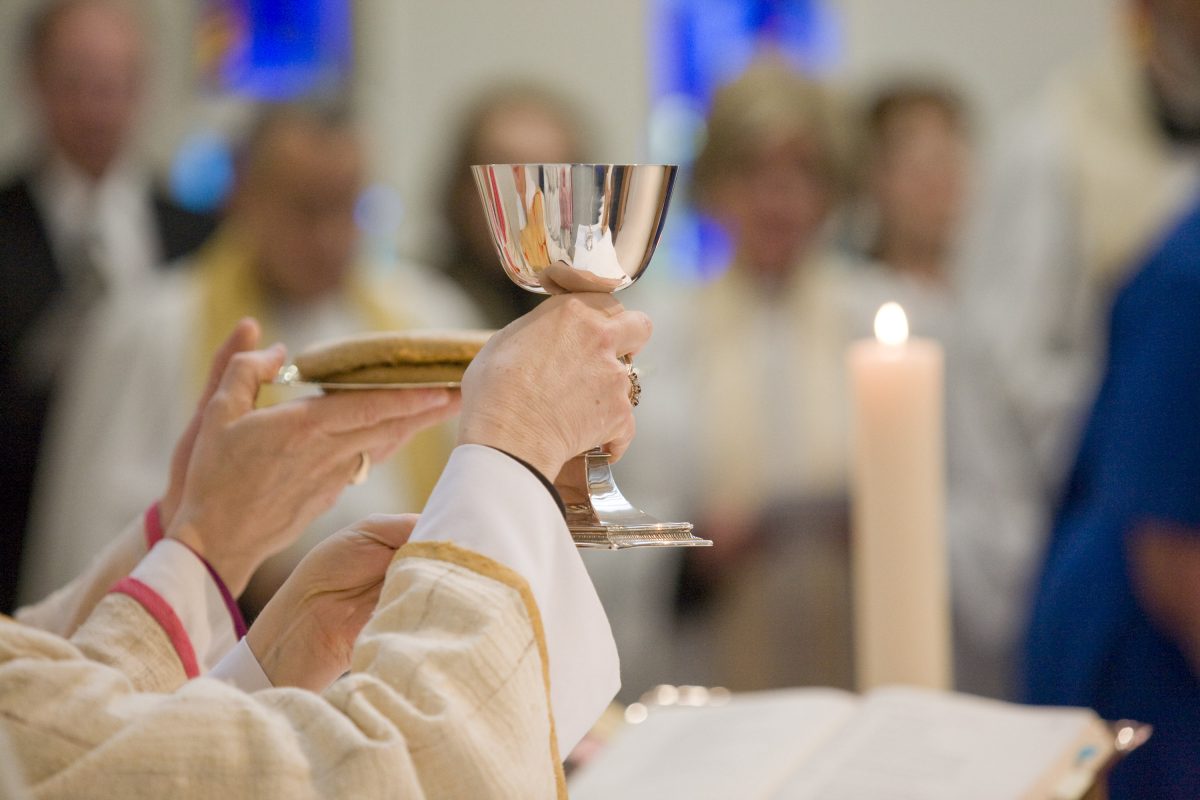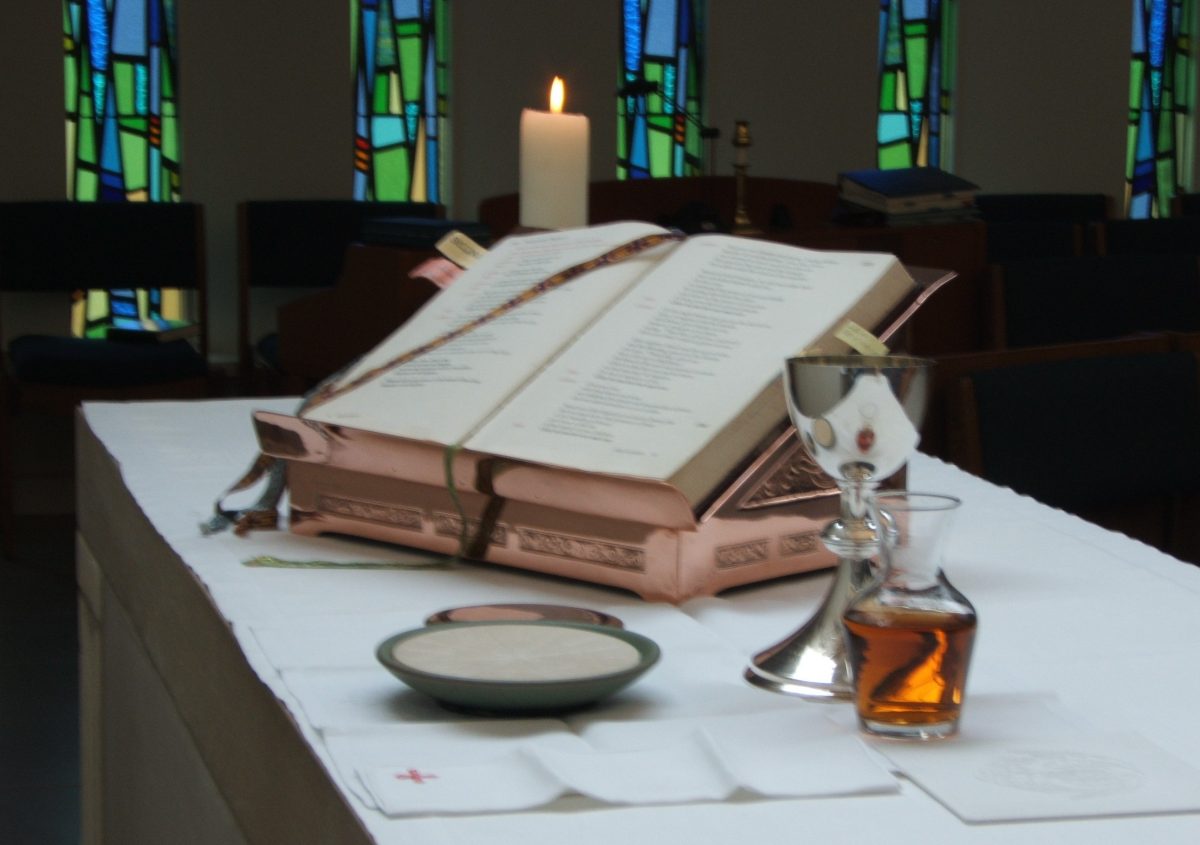By Sr. Constance Joanna, SSJD
Joshua 24.1-2a, 14-18 / Psalm 34.15-22 / Ephesians 6:10 20 / John 6:56-69
“Those who eat my flesh and drink my blood abide in me, and I in them. Just as the living Father sent me, and I live because of the Father, so whoever eats me will live because of me.” (v. 56-57)
“It is the spirit that gives life; the flesh is useless. The words that I have spoken to you are spirit and life.” (v. 63)
I was struck by these two verses which at first glance seem almost contradictory. The first emphases the bodily presence of Jesus in the bread and wine, and the second emphases the spiritual presence. But in fact I think they encompass the fulness of our understanding of the Eucharist as Anglicans. We emphasize the “real presence” of Christ in the physical bread and wine offered and “consecrated” (i.e., set apart as holy things) during the Eucharistic prayer. But we also emphasize the importance of a spiritual communion with Christ that may exist with or without the physical bread and wine.
I find this comforting in the midst of the many questions and often heated discussions that have taken place among Anglicans during the nearly 18 months we’ve been in this pandemic with most of us unable to worship in our church buildings. Should the clergy consecrate the bread and wine and receive it themselves (or with the small number of people allowed in our churches at different times?) while the laity fast from the Eucharist? Should we all fast from the Eucharist and focus entirely on the Liturgy of the Word? Is it good or bad to celebrate the Eucharist online? What about spiritual communion – is it OK for the few people in the church to receive the bread (usually not the wine) and offer a prayer of spiritual communion to be used by the folks participating online?
And what about the common cup? Because it’s impossible for people to drink out of one vessel during a pandemic, we can emphasize the traditional teaching that the fulness of communion is received in the bread only. But what about pouring the wine from the common cup into small glasses for people to drink (as many churches in the Church of England have been doing despite the House of Bishops there having made individual cups “illegal”)? As we break one loaf of bread into small pieces to share with communicants, is it wrong to break out the wine into individual “servings” as well?
These questions have caused much pain and grief over the past 18 months. Unlike the English Reformation in the mid-16th century, we have not been burning people at the stake for expressing the wrong opinion. But feelings about these questions have been strong, and have resulted in both reasoned and passionate arguments. So thinking about all this, and about our own community discussions during our Annual Chapter meetings, I was strongly affected by today’s gospel from John, and especially by the verses I quoted above.
Is it possible that more than one perspective is correct? Maybe the most important thing about all of this discussion and disputation and argument is that it’s a sign of how deep and strong is our desire to be a tangible, living part of the Body of Christ – to have Christ in us, and for us to be in Christ? Despite the theological differences between church traditions over the last 20 centuries, all of us who partake in the discussions are passionate about Jesus and our relationship with him. And that is just so very good and heartening to me.
When King Henry VIII separated the Church of England from the Church of Rome in the 16th century, he remained to the end of his life a passionate Catholic – just not Roman. However, theological and political influences from the continental reformation (both Lutheran and Calvinist) were already penetrating England and it didn’t take long for the Church of England (essentially one with England itself) to find itself embroiled in theological and political turmoil.
When Henry died in 1547, his young son Edward VI came to the throne and under the influence of Archbishop Cranmer, the first English Book of Common Prayer was published in 1549. While it was in the English language, it followed closely the Sarum rite which was the standard Catholic liturgy in England, and very little changed from the Roman understanding of the presence of Christ being physically present in the offering of bread and wine. One of the main differences from the medieval Catholic practice, however, was that the 1549 Prayer Book insisted that everyone should receive the wine as well as the bread (“Drink ye all of this” – i.e. all of you, drink of this cup). No wonder that we have inherited that insistance.
When the priest offered the bread and wine to the people in the 1549 prayer book, he said:
“The body of our Lord Jesus Christ, which was given for thee, preserve thy body and soul unto everlasting life.”
and
“The blood of our Lord Jesus Christ, which was shed for thee, preserve thy body and soul unto everlasting life.”
This was entirely too Catholic for those in the Church of England who were being influenced by a more Protestant theology of the Eucharist. And so when the second Book of Common Prayer was published just three years later in 1552, Cranmer changed the words of administration:
“Take and eat this in remembrance that Christ died for thee, and feed on him in thy heart by faith with thanksgiving.”
and
“Drink this in remembrance that Christ’s Blood was shed for thee, and be thankful.”
It’s no longer a matter of “eat my flesh and drink my blood,” but rather, “It is the spirit that gives life.” The celebration of the Eucharist (or Holy Communion as it was called) had become a memorial of Christ’s sacrifice. More Good Friday than Maundy Thursday.
Edward VI reigned for only six years, as he was a sickly child and died at the age of 15. His half-sister, Mary, succeeded to the throne, and as a fervent Catholic she outlawed both the first and second prayer books, reinstated the Roman Catholic mass, and persecuted Protestants (including those in the Church of England) pitilessly, earning her the title “Bloody Mary.” Archbishop Cranmer was one of her victims to be burned at the stake.
Like Edward, she reigned only six years, and when she died in 1558, she was succeeded by her half-sister Elizabeth, who brought stability to England with a reign of 45 years (she died in 1603). One of her greatest legacies was to convince Parliament to pass laws that ensured a philosophy of the via media or “middle way.” A new Book of Common Prayer was published in 1559, and the words of administration combine the “Catholic” words from the 1549 book and the more “Protestant” words from the 1552 book. They are emblematic of what came to be called “The Elizabethan Compromise” and have continued to be used in more recent versions of The Book of Common Prayer throughout the English-speaking provinces of the Anglican Communion:
“The body of our Lord Jesus Christ, which was given for thee, preserve thy body and soul unto everlasting life. Take and eat this in remembrance that Christ died for thee, and feed on him in thy heart by faith with thanksgiving.”
and
“The blood of our Lord Jesus Christ, which was shed for thee, preserve thy body and soul unto everlasting life. Drink this in remembrance that Christ’s Blood was shed for thee, and be thankful.”
In various contemporary alternative service books the words of administration are much simpler (and consequently open to a great variety of interpretation):
“The Body of Christ, broken for you” (or “given for you”) or “The body of Christ, the bread of heaven.”
and
“The blood of Christ, shed for you” or “The blood of Christ, the cup of salvation.”
And so as our churches and communities continue to debate the various theological and liturgical perspectives on the Eucharist, perhaps we can take heart and even rejoice in the words of Jesus:
“Those who eat my flesh and drink my blood abide in me, and I in them. Just as the living Father sent me, and I live because of the Father, so whoever eats me will live because of me.” (v. 56-57)
“It is the spirit that gives life; the flesh is useless. The words that I have spoken to you are spirit and life.” (v. 63)
Both are true, and may we all be gentle and understanding with one another, rejoicing that the Eucharist is important enough for us that we debate its practice and theology, and perhaps also remembering these words sometimes used at the Fraction, attributed to Elizabeth I – if not written or spoken by her, certainly an example of Christ-like compromise: peace, gentleness, and understanding.
“The Word it was that spoke it,
He took the bread and broke it;
And what the Word did make it,
That I believe, and take it.”




